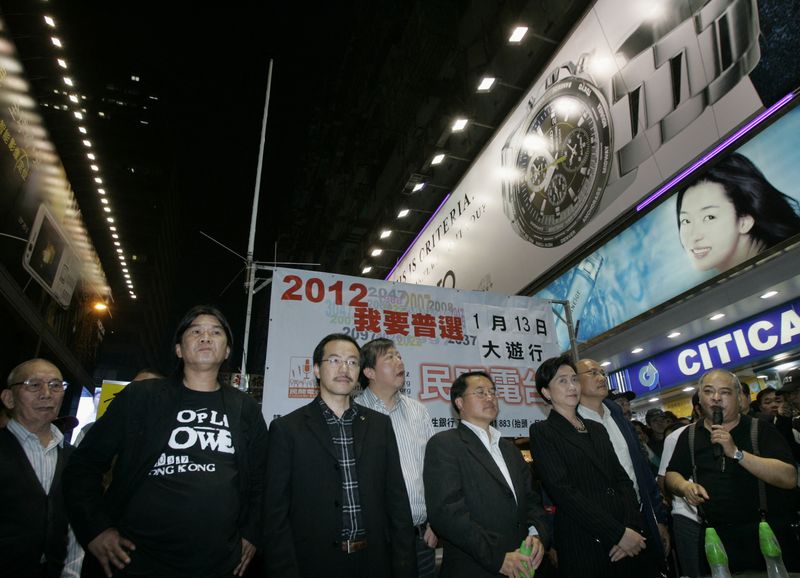
[ad_1]

© Reuters. FILE PHOTO: An antenna is set up on a street in Hong Kong’s Mongkok shopping district as pro-democracy activists Leung Kwok-hung (2nd L) and Tsang Kin-shing (R), a host at Citizens’ Radio, along with pro-democracy lawmakers Emily Lau (3rd R) and Lee Wing-
By Jessie Pang
HONG KONG (Reuters) -Hong Kong’s pro-democracy online Citizens’ Radio station aired its final show on Friday and will cease operations owing to what its founder described as a “dangerous” political situation and the freezing of its bank account.
Launched in 2005 by veteran activist Tsang Kin-shing, the Cantonese-language broadcaster gained a steady following for its hard-hitting talk shows that were critical of authorities, as well as its years-long campaign for press freedom.
Its closure marks a further erosion of Hong Kong’s media diversity, critics say. A China-imposed national security law has already led to the shutting of other liberal outlets including the Apple (NASDAQ:) Daily newspaper and Stand News.
“We had no choice but to suspend broadcasting after tonight’s show,” Tsang told reporters before the final broadcast in which all of the station’s hosts squeezed into a small studio to bid farewell.
“Hong Kong’s politics faces a cliff-like change. Even if we invite guests to the programme, they cannot speak freely, because the red line is everywhere.”
Authorities have clamped down on dissent in the former British colony and arrested more than 250 activists under the national security law, following a pro-democracy movement in 2019 that drew millions onto the streets.
“Thank you for your support over the past 18 years. Hope to see you soon!” Tsang said.
Bank used different “excuses to freeze his radio station’s bank account, he said, including signature problems to block him from receiving donations and withdrawing money.
“Because our resources are very limited, the rent can only be paid until August.”
Hang Seng Bank declined to comment.
Jimmy Pang, a host at Citizens’ Radio, was defiant during what he called an important night in Hong Kong’s broadcasting history. “Mic off doesn’t mean we can no longer speak out,” he said.
Hong Kong authorities have repeatedly said that media freedoms are respected and enshrined in city laws. The government denies cracking down on dissent but has said the protests in 2019 threatened the stability upon which the financial hub’s economic success depends.
Media rights group Reporters Without Borders (RSF), ranked Hong Kong 140th out of 180 in its annual global media freedom index this year, down from 73 before the national security law was enacted in 2020.
“For nearly two decades, Citizens’ Radio has been an emblematic contributor to Hong Kong’s independent broadcasting landscape and its shutdown would be an irreplaceable loss for media diversity,” the press freedom group’s East Asia director, Cédric Alviani, said in a statement.
Citizens’ Radio applied for a broadcasting licence in 2005 but it was never granted. It set up FM transmitters at the top of the city’s iconic Lion Rock mountain and was raided by the Office of the Communications Authority (OFCA) for allegedly using an illegal radio transmitter. The station continued to broadcast online.
In 2019, four masked men wielding bats and hammers barged into the station after smashing through its glass door. No arrests were made.
OFCA declined to comment on the closure or erosion of press freedom but said the station was internet-based and “not a sound broadcasting licensee” under telecommunications laws.
A national security case against Apple Daily and its tycoon founder, Jimmy Lai, will begin in September. The maximum sentence is life imprisonment.
In October, a verdict will be handed down in a sedition trial against two editors at the now shuttered Stand News.
Hong Kong returned to Chinese rule in 1997 under a “one country, two systems” agreement aimed a preserving its freedoms for 50 years.
“I am 67 years old. I don’t know if I can witness it,” Tsang said. “I hope that young people will continue to stick to their ideals, stick to their beliefs that there will be a tomorrow.”
[ad_2]